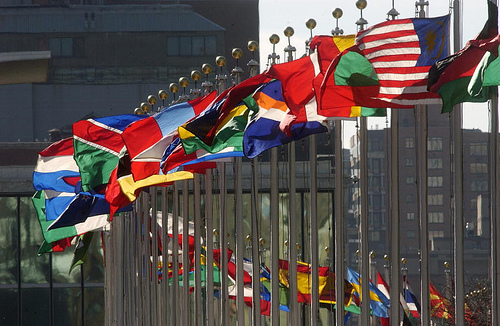If the earth was a car, it would come with an operating instructions not to drive faster than 350 parts per million of carbon in the atmosphere. Unfortunately, like an unruly teenager, humanity – with the United States in the drivers seat – has already revved up the engine and broken all speed limits – we’re speeding at 387 ppm and our tires are already smoking. Unless we start breaking, we’re full speed ahead towards engine meltdown in the scarily near future.
The final plenary session today at the Bonn climate talks drove this point home. As the draft “shared vision” language was discussed (the language that will eventually form the preamble to the agreement) various country delegations put their positions on the table. While the Alliance of Small Island States pleaded for immediate action to keep their nations from sinking into the ocean by adopting clear targets to keep the world below 2 degrees of warming by enshrining science-based targets in the text: a 45 percent reduction in global greenhouse gas emissions by 2020 and more than 90 percent by 2050 (from 1990 levels). The EU is halfway there, suggesting a goal of 50 percent (from 1990 levels) by 2050. The United States, however, gave a disappointingly Bush-esque statement calling for a purely aspirational vision containing no clear target for reductions.
The negotiations here are the world’s best hope to prevent total climate meltdown in our lifetimes. The science is clear – and millions of people around the world are asking for action. With the conclusion of this round of talks, negotiators have succeeded in creating a legal draft text that will be refined at the next round of talks in Bonn in August – now up to 200 pages from the original 50 created in Poznan - but we still are missing the critical fuel that we will need to continue the process all the way to Copenhagen: the political will to actually achieve emissions reductions, particularly on the part of the United States. We’re also missing adequate traffic rules – the safeguards that will ensure that whatever else we do, we will make sure that we don’t sacrifice biodiversity or indigenous cultures on the way to saving the climate.
As we move towards Copenhagen, the world needs to hear President Obama clearly commit, “the level of our ambition must rise to match the urgency of the challenge that is facing the world,” and give the U.S. delegation the mandate it needs for a successful deal in Copenhagen. It’s clear that if the United States chooses to lead, other recalcitrant countries like Australia and Saudi Arabia will be more likely to follow.
In many ways, the U.S. is in the drivers seat. If we aren’t going to drive the world off a cliff, we have to learn to drive more carefully. We’ve already gotten so many speeding tickets – from the financial meltdown to the food crisis. Obama has been doing a good job patching up some of our reckless driving injuries, but climate change is and will be different. Mother Nature is one car that we can’t afford to total.



